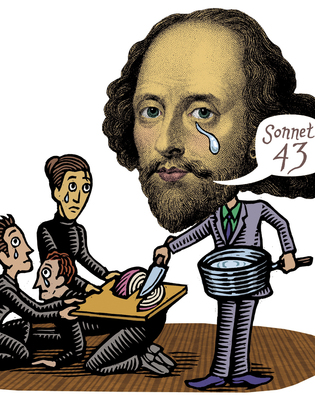 loading
loading
Sonnet slam Gregory NemecView full imageYet be most proud of that which I compile,
I didn’t even bring along a paper printout when I arrived at Sterling Library’s Linonia and Brothers Reading Room just before 2:00 p.m. on Sunday, February 12. As I settled in with coffee and a chocolate-almond scone (no false advertising in the “Dessert” name), I noticed cheat-sheets abounding in the hands of my fellow performers. I vowed I’d still do it from memory: I had put in the work, and I’d never really liked the whole “sunk costs” idea in Intro Econ. Then I ripped page 537, the page with my sonnet, out of the book we’d been using in Kastan’s class. Just in case. I found out later that, in the weeks before the Dessert, two dozen people had dropped out—leading Sirakian and Co. to lift the memorization guideline in order to enlist new performers. Still, many performers had memorized their sonnets, or tried. And many turned in creative and amusing performances. Miller and Kamens—who didn’t make a single mistake—held up not only their paper pyramid, but also an issue of the New Haven Register (“Thy registers and thee I both defy”). During the final couplet—“I will be true despite thy scythe and thee”—Miller, a self-proclaimed ham, brandished a sickle (the closest thing to a scythe she had available, she said later). Zachary Bell, of Control Group, read his sonnet off his laptop while simultaneously typing it into an e-mail. After all, he says, the narrator of Sonnet 116 is “basically a guy who cheated and was like 'Oh, but I did it to prove how much I love you.’” To Bell it sounded exactly like the kind of excuse you send in an e-mail. Plus, he wanted to highlight the nature of text. So, as soon as he’d finished his 14 lines, he sent the e-mail to all the Sonnet Dessert participants. As for Patrick Cage, he dramatized the artifice of drama with an onion. He had three assistants: one went down on all fours, offering his back as a table, and two held a cutting board steady on this surface. Cage recited his grief-filled sonnet while cutting up his onion and dropping the pieces into a pot of water. And voilà: tears. They were “clearly contrived but more grounded in reality than acted tears,” he explained later. The audience may or may not have gotten the point. But Cage got a lot of laughs. Sonnet 91 was performed by an intergenerational group of four: philosophy department chair Tamar Szabó Gendler ’87; her nine-year-old son, Jonah; and Jonah’s friends Eliana Ross and Lanie Barnett. They alternated, delivering their memorized lines flawlessly. They had spent two full Sunday afternoons and countless carpool rides thinking about their parts and about the meaning of sonnets in general. “What I liked about performing it,” says Barnett, who’s also nine, “is before I got up there I could hear everyone else’s and that could give me an idea about what emotion I could put in my lines.”
But thou art all my art, and dost advance
Barnett had attended the Yionoulis workshop with Gendler and Jonah, and must have paid better attention than I did. I almost made it, though. Through 11 lines, I looked straight out into the audience, which was overflowing with performers and other visitors. I was home free, flying away with pride. And then I crashed on line 12—stumbling, pausing, and repeating myself. Line 13, next to last, was no better. I had to look down at the page I had ripped out of my book. Then I stared out once more at all the assembled sonnet lovers and, from rote memorization, pronounced that I had learned my rude ignorance.
The comment period has expired.
|
|